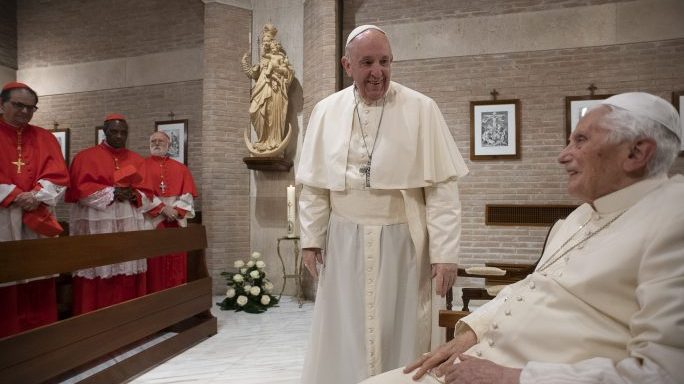Eight years to the date since he officially left the See of Peter vacant, Pope emeritus Benedict XVI still has to repeat that “there is only one pope,” that his decision to resign was made with full freedom, and it wasn’t due to a gay lobby in the Vatican.
In an interview released Monday, he also refers to Pope Francis’s upcoming trip to Iraq and to U.S. President Joe Biden.
“It was a difficult decision,” Benedict told Corriere della Sera, an Italian newspaper, on Feb. 28, the eight anniversary of the day in which his resignation became effective. “But I took it in full consciousness, and I think I did well. Some of my slightly ‘fanatical’ friends are still angry, they did not want to accept my choice.”
“I think of the conspiracy theories that followed it: There were those who said it was the fault of the Vatileaks scandal, some of a conspiracy by the gay lobby, some because of the conservative Lefebvrian theologian Richard Williamson. They don’t want to believe in a conscious choice. But my conscience is fine,” he said.
The Vatileaks scandal refers to the leak of confidential documents leaked by the pope’s butler exposing corruption, bribes and power struggles to try to prevent Benedict’s efforts to implement greater financial transparency. The documents leaked included an anonymous letter warning of a death threat against Benedict.
The gay lobby, the existence of which Pope Francis acknowledged during a 2013 press conference on board the papal plane on the way back from his trip to Brazil, has long been the rumored cause for the German pontiff’s resignation. In the days leading to his Feb. 11 surprise announcement, Italian media carried several unsourced reports of gay Vatican clergy working together to advance their personal interests and leaving the Holy See vulnerable to blackmail.
Lastly, the Williamson matter involved the scandal of Benedict “rehabilitating” four bishops who had been ordained in 1988 by Archbishop Marcel Lefebvre, founder of the traditionalist Society of Pius X, for which they incurred automatic excommunication. The pontiff in 2009 decided to lift those excommunications, and soon after the scandal broke: Williamson had appeared on a pre-taped TV interview denying the Holocaust, a crime punishable with up to five years in Germany. The canonical sanctions on the men were reinstated, and Benedict had to publicly apologize for what happened.
According to Corriere, Benedict’s voice is “thin as a breath,” and during some sections of the conversation, almost soundless. His personal secretary, Archbishop Georg Gaenswein was also present at the interview, and in some rare passages repeats and “translates” while Benedict nods in approval.
“The mind remains clear, quick as the eyes, alert and lively,” writes the journalist who met with the pope emeritus. “The white hair is slightly long, under the papal skullcap as white as his robe. Two very thin wrists emerge from his sleeves, highlighting an image of great physical fragility. Ratzinger wears a watch on his left wrist and on his right a strange contraption that looks like another watch but is actually an alarm ready to go off if something happens to him.”
After a short discussion of Italian politics and the COVID-19 pandemic, the conversation turns to Pope Francis’s upcoming March 5-8 trip to Iraq. Here, the journalist claims, Benedict’s expression “becomes serious, worried.”
“I think it’s a very important journey,” Benedict said. “Unfortunately, it falls at a very difficult time that also makes it a dangerous trip: For security reasons and for COVID. And then there is the unstable Iraqi situation. I will accompany Francis with my prayer.”
Benedict also commented on Joe Biden, the second Catholic president in U.S. history: “It is true, he is Catholic and observant. And he is personally against abortion. But as a president he tends to present himself in continuity with the line of the Democratic Party … And on gender politics we have not yet fully understood what his position is.”

